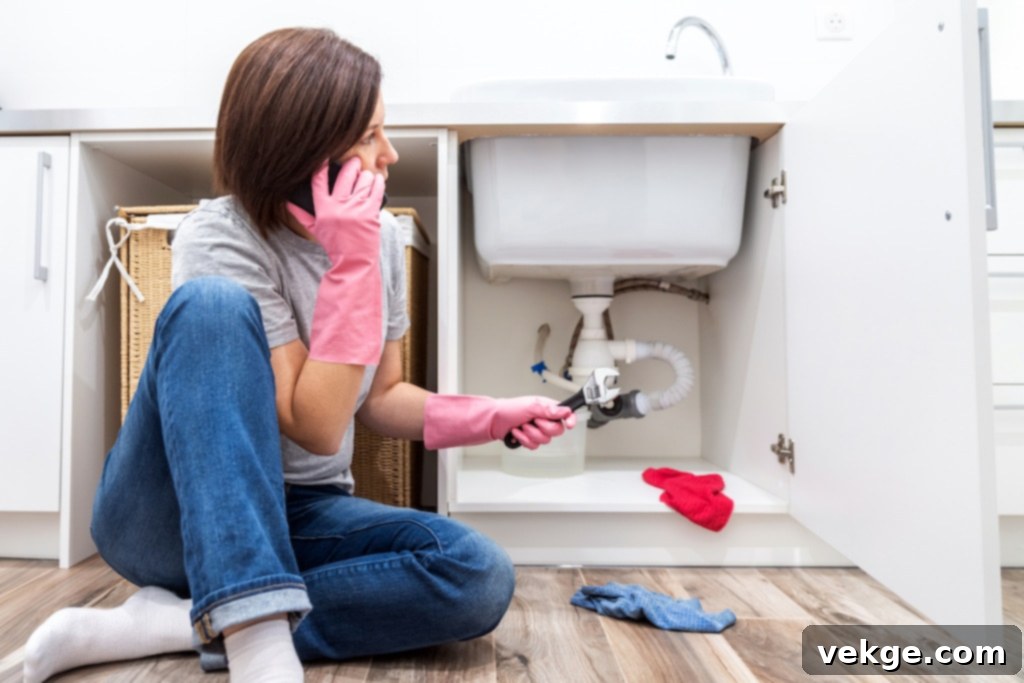The Ultimate Homeowner’s Guide to DIY Plumbing Maintenance & Preventing Costly Issues
Congratulations on embarking on your journey as a homeowner! As you settle into the unique comforts of your new abode, it’s an ideal time to familiarize yourself with the essential aspects of home care, particularly DIY plumbing maintenance. While plumbing might not always be the most glamorous topic, it’s undeniably a crucial component of home ownership that can safeguard you from significant headaches, costly repairs, and potential water damage.
This comprehensive guide is designed to empower you with the knowledge and practical tips needed to keep your plumbing system in excellent working condition. By adopting a proactive approach and understanding both simple preventative plumbing measures and when to seek expert help, you’ll ensure a smoothly flowing, efficient, and reliable plumbing system for years to come.
Regular Inspections for Peace of Mind
One of the most effective strategies for preventing major plumbing issues is to make routine inspections a core part of your home maintenance schedule. Start by systematically examining all exposed pipes – under sinks, behind toilets, in utility rooms, basements, and crawl spaces. Look for any visible signs of trouble: drips, puddles, discolored patches on walls or ceilings, rust, corrosion, or unusual warping of pipes. Even minor dampness can indicate a slow leak that, if left unaddressed, can lead to significant water damage, mold growth, and expensive structural repairs.
Pay close attention to connections around appliances like dishwashers, washing machines, and refrigerators, as these are common areas for leaks. By catching these small problems early, you not only save water and money but also extend the lifespan of your entire plumbing infrastructure, ensuring peace of mind.
Promptly Address Leaks and Drips
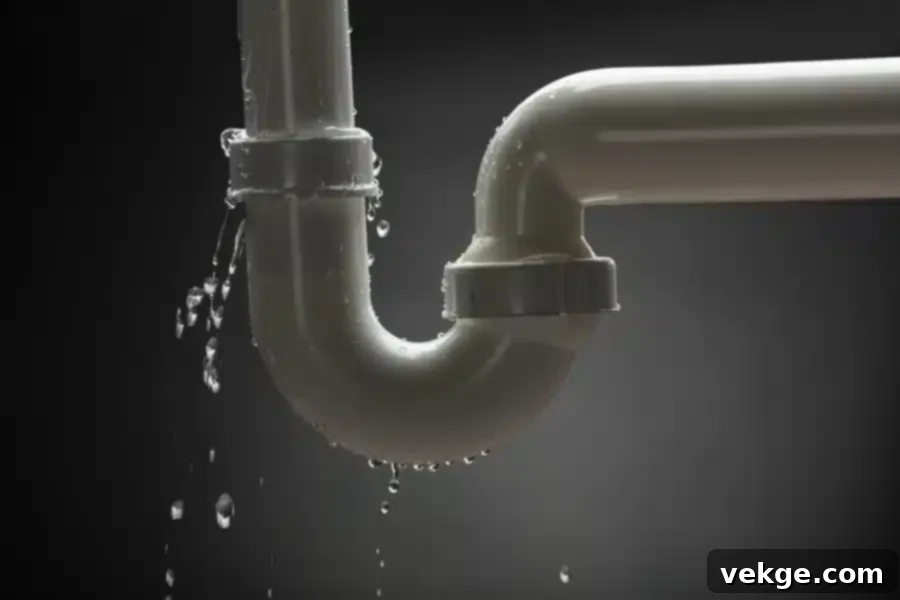
While a dripping faucet or a minor pipe leak might seem insignificant at first, the cumulative effects can be substantial. A single dripping faucet can waste hundreds, even thousands, of gallons of water per year, leading to unnecessarily high water bills. More critically, persistent leaks, especially those hidden behind walls or under floors, can cause severe structural damage, foster unhealthy mold and mildew growth, and even compromise your home’s foundation.
Take swift action to repair any detected leaks. For faucets, this often involves tightening loose connections or replacing worn-out washers or O-rings. For pipes, a temporary fix might involve pipe sealant or repair tape, but it’s crucial to identify the root cause. If you’re unsure, or the leak persists, do not hesitate to consult a professional plumber. A proactive approach to addressing leaks is not just about saving water; it’s about protecting your most valuable asset – your home.
Maintain Clear and Free-Flowing Drains
Clogged drains are perhaps one of the most common and frustrating household plumbing issues. The good news is that they are highly preventable with consistent care. The first line of defense is installing drain strainers in all sinks, showers, and bathtubs. These inexpensive devices effectively capture hair, food remnants, soap scum, and other debris before they can enter your pipes and form stubborn blockages.
Beyond strainers, regularly flush your drains with a natural solution. Pouring a cup of baking soda down the drain, followed by a cup of white vinegar, can work wonders. The effervescent reaction helps to break down greasy buildup and dislodge minor clogs. Let it sit for 20-30 minutes, then flush with hot water. Avoid harsh chemical drain cleaners, as they can be corrosive to your pipes and harmful to the environment. Consistent maintenance will keep your drains running smoothly and prevent inconvenient backups.
Optimize Water Pressure for Efficiency
Your home’s water pressure plays a significant role in the overall health and efficiency of your plumbing system. Both excessively low and dangerously high water pressure can indicate underlying issues. Low pressure can make showers unsatisfying and appliances inefficient, while high pressure can stress your pipes, leading to premature wear, leaks, and damage to fixtures and appliances.
Regularly check your water pressure – a simple gauge can be screwed onto an outdoor spigot for an accurate reading. The ideal range is typically between 40-60 psi. If your pressure is too high, consider installing a pressure reducing valve (PRV). If it’s too low, inspect faucets and showerheads for mineral deposits or debris that may restrict flow. Cleaning or replacing aerators and showerheads can often restore optimal pressure and improve water efficiency throughout your home.
Winterize Your Pipes Against Freezing
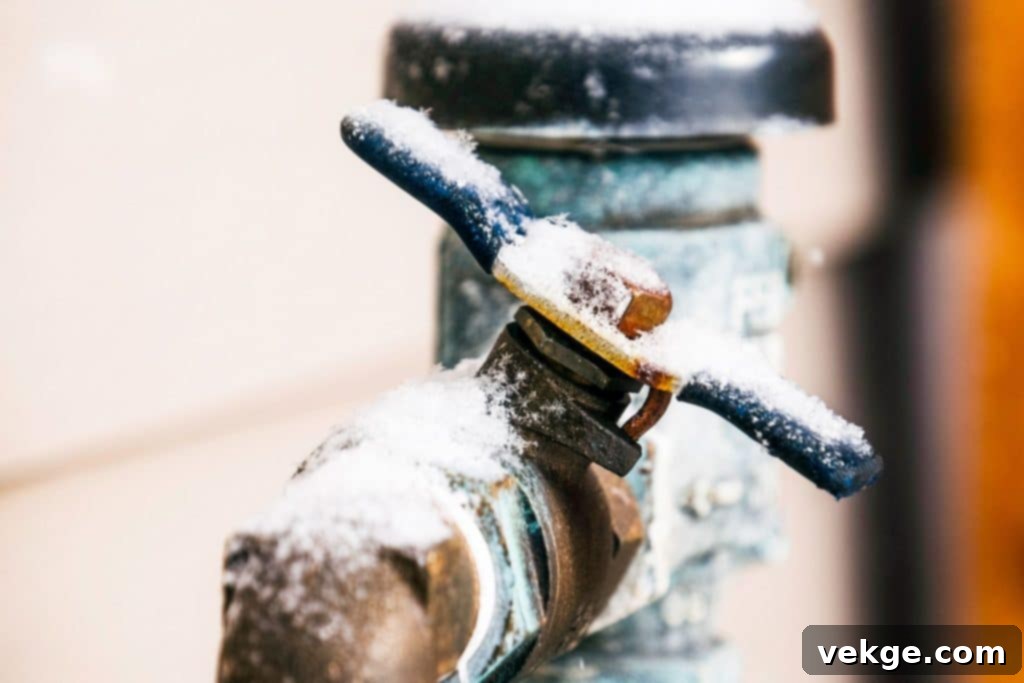
For homeowners in colder climates, preparing your plumbing for winter is non-negotiable. Frozen pipes are a significant risk, and a burst pipe can lead to catastrophic water damage, costing thousands in repairs. Insulate all exposed pipes, particularly those in unheated areas like attics, basements, crawl spaces, and garages. Foam pipe sleeves or heat tape are excellent, cost-effective solutions for this preventative plumbing measure.
During periods of extreme freezing temperatures, it’s a good practice to let faucets drip slightly. This allows a continuous flow of water, preventing pressure buildup within the pipes that could lead to bursting if the water inside freezes. Additionally, disconnect and drain garden hoses, and turn off and drain exterior water spigots to prevent ice from forming and causing damage to your outdoor plumbing.
Ensure Proper Care for Your Water Heater
Your water heater is one of the hardest-working appliances in your home, supplying hot water for daily needs. Consistent upkeep is vital for its durability, efficiency, and safety. One of the most important tasks is to periodically flush the tank. Sediment (minerals from your water supply) can accumulate at the bottom of the tank, reducing heating efficiency, increasing energy costs, and potentially leading to premature failure. Flushing removes this buildup and helps your unit run more effectively.
Beyond flushing, routinely check for any signs of leaks around the base, listen for unusual noises (like rumbling or popping), or notice fluctuations in water temperature. These can all be indicators of internal problems. While flushing can be a DIY task, any complex repairs or anode rod replacements should be handled by a professional plumber to ensure safety and proper functioning.
Show Some Love to Your Garbage Disposal
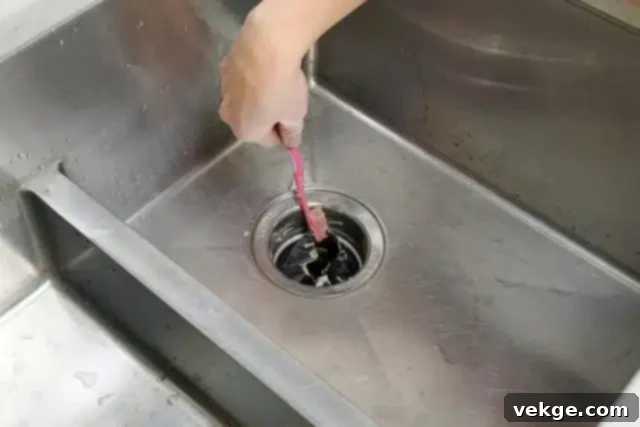
Your kitchen’s garbage disposal is incredibly convenient, but it requires proper usage and care to function smoothly and avoid breakdowns. The golden rule is to avoid overloading it with large or fibrous items such as celery stalks, potato peels, coffee grounds, eggshells, and especially grease. These items can dull the blades, jam the motor, or create stubborn clogs further down your drain line. Always run cold water before, during, and after using the disposal to help flush food particles through.
To keep it fresh and odor-free, regularly grind a tray of ice cubes (to clean the blades) or citrus peels (to freshen the smell). A mixture of baking soda and vinegar can also be poured down the drain to neutralize odors. Treating your garbage disposal kindly will save you from unpleasant smells and expensive repair calls.
Know When to Seek Professional Help
While embracing DIY plumbing fixes is admirable and can save money, it’s crucial to recognize the limits of your expertise. Certain plumbing issues necessitate the specialized skills and tools of a professional plumber. If you encounter major leaks that are difficult to locate or stop, persistent sewer backups, suspected gas line problems, or any complex repairs that are clearly beyond your comfort level or knowledge, do not hesitate to call the pros.
Attempting to fix major plumbing problems yourself without the proper experience can often lead to more extensive and costly damage, potential safety hazards (like gas leaks), or even legal ramifications if not performed correctly. Timely intervention by a licensed and experienced plumber can prevent small issues from escalating into significant home disasters and ensure the long-term integrity of your plumbing system.
Schedule Professional Inspections and Maintenance
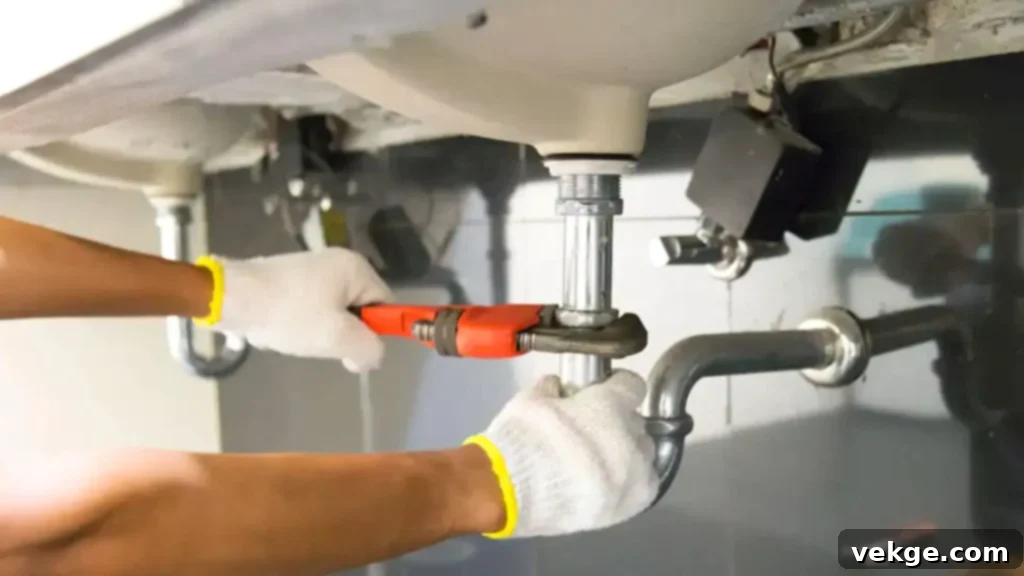
While your own inspections are valuable, they can’t replace the thorough assessment provided by a licensed expert plumber. Consider scheduling annual or bi-annual professional inspections for your entire plumbing system. These skilled professionals possess the tools and expertise to conduct a comprehensive evaluation, identifying potential issues that might be invisible to the untrained eye, such as hairline cracks, corroded pipes in inaccessible areas, or issues within your main sewer line.
During these visits, they can perform preventive maintenance tasks, test water pressure, inspect water heater components (like the anode rod), and ensure all elements are operating efficiently. Professional maintenance not only helps prevent future emergencies but also significantly extends the lifespan of your plumbing fixtures and appliances, offering substantial long-term savings and peace of mind.
Invest in Professional Drain Cleaning
While your DIY methods with hot water, baking soda, and vinegar are excellent for preventing minor clogs, they often aren’t sufficient for deep cleaning or removing stubborn, deep-seated blockages. For persistent slow drains, recurring clogs, or foul odors indicating significant buildup, professional drain cleaning and repair is essential.
Plumbers utilize specialized tools and techniques, such as powerful hydro-jetting (which uses high-pressure water to scour pipe interiors) and robust drain snakes or augers (to physically break through and remove debris, grease buildup, and even invasive tree roots). These methods effectively clear your drains and sewer lines, restoring optimal flow and preventing recurring issues that can lead to costly backups and damage. This investment in drain maintenance is crucial for the overall health of your home’s plumbing.
Address Plumbing Repairs Promptly
It cannot be stressed enough: if you notice any signs of plumbing problems, do not delay. Symptoms like consistently slow drains, gurgling sounds, foul odors emanating from drains, sudden water discoloration, or unusual knocking or banging noises within your pipes are all warning signs. These are not minor inconveniences to be ignored; they are indicators of underlying issues that can rapidly worsen.
Overlooking these warning signs can quickly lead to more severe damage, extensive water waste, and significantly more expensive repairs. For example, a persistent slow drain might indicate a partial blockage that could soon become a complete backup, potentially overflowing and damaging your property. Addressing these plumbing repairs promptly by calling an expert plumber can prevent major disruptions, protect your home, and uphold the overall integrity of your entire plumbing system.
Consider Upgrading Older Plumbing Systems
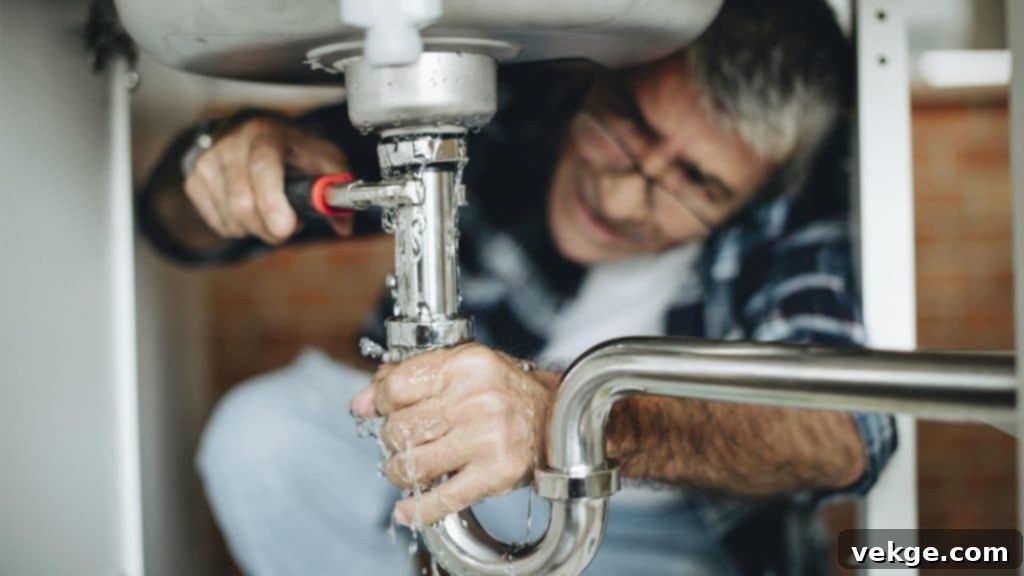
If your home features older plumbing fixtures or pipes, particularly those made of outdated materials like galvanized steel or even lead, it might be time to consider an upgrade. Pipes nearing the end of their lifespan are more susceptible to corrosion, leaks, and reduced water quality. Consult with a qualified plumber about upgrading to more efficient, durable, and safer options, such as PEX or copper piping. Modern plumbing technologies offer numerous advantages, including enhanced water efficiency, superior durability, and a significantly diminished likelihood of leaks, corrosion, and other typical plumbing problems that plague older systems.
Beyond pipes, upgrading to low-flow toilets, efficient showerheads, and modern faucets can also lead to significant water savings and an improved user experience, contributing to a greener and more cost-effective home.
Create a Plumbing Maintenance Schedule
Staying organized is key to effective home plumbing maintenance. Developing and adhering to a detailed plumbing maintenance schedule can help you remain proactive and prevent overlooked tasks. Jot down dates for crucial activities: monthly checks for leaks, quarterly drain flushing, annual water heater maintenance, and scheduled professional inspections. Utilize calendar reminders or enlist the services of a professional plumbing company that offers maintenance plans to ensure timely and thorough upkeep throughout the year. A well-planned schedule ensures that no vital maintenance task is forgotten, contributing to a healthier, more resilient plumbing system.
Conclusion: A Proactive Approach to Plumbing Care
In conclusion, a robust approach to home plumbing care combines diligent DIY maintenance with strategic professional intervention. By incorporating regular visual inspections, promptly addressing minor leaks and clogs, properly caring for appliances like your water heater and garbage disposal, and preparing for seasonal challenges like winter, you empower yourself to prevent many common and costly plumbing problems.
Equally important is recognizing when to call in the experts. Partnering with skilled plumbers for professional inspections, thorough drain cleaning, and timely repairs of complex issues is invaluable. This hybrid strategy — your attentive DIY efforts complemented by expert services — is the ultimate key to ensuring a healthy, efficient, and reliable plumbing system for your home. Embrace this proactive mindset, and you’ll enjoy the peace of mind that comes with a smoothly flowing and well-maintained home for many years to come!
